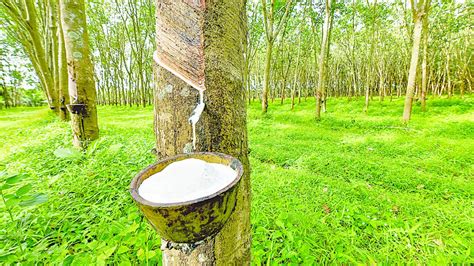Rubber cultivation has been a cornerstone of Nigeria’s agricultural sector for decades, contributing significantly to employment, rural development, and foreign exchange earnings.
The southern regions of the country, with their favorable climatic conditions, are the primary hubs for rubber production:
1. Edo State
Edo State is Nigeria’s leading producer of natural rubber. The state’s favorable climate and soil conditions support extensive rubber plantations.
Communities such as Uhunmwode, Orhionmwon, Ovia South West, Owan West, Ikpoba Okha, Esan Central, and Esan South East are actively involved in rubber cultivation.
2. Ondo State
Ondo State has a long-standing history in rubber cultivation and continues to be a major contributor to Nigeria’s rubber industry.
The state’s favorable climate and soil conditions support extensive rubber plantations, making it one of the top producers in the country.
3. Osun State
Osun State ranks third in rubber production in Nigeria. The state’s favorable climatic conditions and soil types make it suitable for rubber cultivation.
Communities within the state are actively engaged in rubber farming, contributing significantly to the state’s agricultural output.
4. Cross River State
Cross River State benefits from favorable climatic conditions for rubber cultivation.
Its plantations contribute significantly to the state’s agricultural economy and provide employment for residents.
5. Delta State
Delta State has a rich history of rubber cultivation, with numerous plantations contributing to the state’s agricultural economy.
The state’s favorable climatic conditions support the thriving of rubber plantations, contributing significantly to Nigeria’s overall rubber production.
6. Ogun State
Ogun State has several established rubber plantations, supported by the state’s favorable climate and fertile soil.
Communities across the state are actively involved in rubber cultivation, contributing significantly to both local employment and Nigeria’s overall rubber production.
7. Abia State
Abia State is known for its rubber plantations and plays an important role in Nigeria’s rubber industry.
The state’s favorable climatic conditions and soil types make it suitable for rubber cultivation, contributing to the nation’s overall rubber production.
8. Akwa Ibom State
Akwa Ibom has favorable conditions for rubber cultivation, supporting its contribution to the nation’s rubber output.
The state’s involvement in rubber farming adds to the diversity of Nigeria’s rubber-producing regions.
9. Bayelsa State
Bayelsa State’s participation in rubber cultivation enhances the nation’s overall rubber industry.
The state’s favorable climate and soil types support the thriving of rubber plantations, contributing to Nigeria’s rubber production.
10. Ebonyi State
Ebonyi contributes to Nigeria’s rubber production, supporting the agricultural economy.
The state’s involvement in rubber farming adds to the diversity of Nigeria’s rubber-producing regions.
Nigeria’s rubber industry plays a crucial role in the nation’s economy, providing employment opportunities and contributing to foreign exchange earnings.
The southern regions with their favorable climate, continue to be the backbone of rubber production in the country.

